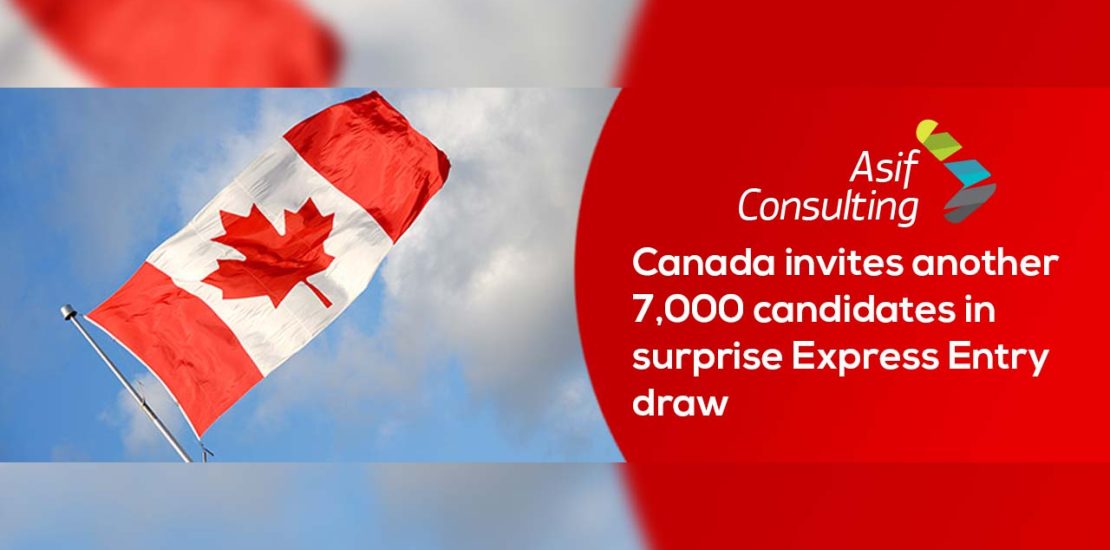Canada invites another 7,000 candidates in surprise Express Entry draw
- March 24, 2023
- Posted by: ASIFCONSULTING
- Category: News Update


Canada invites another 7,000 candidates in surprise Express Entry draw
The IRCC has just announced the eighth Express Entry draw for 2023.
In an all-program draw, Immigration, Refugees and Citizenship Canada (IRCC) issued invitations to apply (ITAs) to 7,000 candidates with a minimum Comprehensive Ranking System (CRS) score of 484. Candidates from the Federal Skilled Worker Program (FSWP), the Canadian Experience Class (CEC), and the Federal Skilled Trades Program are considered in an all-program draw (FSTP).
This draw size is tied with the largest-ever all-program draw on March 15, which included 7,000 candidates. Candidates in that draw had a CRS score of at least 490. The previous record-high all-program draw was held on January 18, when IRCC invited 5,500 candidates.
The draw is surprising because it is the second week in a row that IRCC has invited Express Entry applicants. Candidates. Express Entry draws are usually held every two weeks. Aside from being tied for the largest all-program draw ever, the 7,000 ITAs represent the second-largest Express Entry draw size of all time, trailing only the record-breaking CEC-only draw in February 2021.
All draws took place between July and November 2022, with the smallest draw on July 6 inviting only 1,500 candidates. It was the first all-program draw after an 18-month hiatus caused by the COVID-19 pandemic.
Express Entry draws in early 2023 focused primarily on Provincial Nominee Program candidates (PNP). So far this year, there have been four PNP-only Express Entry draws, the most recent on March 1, when 667 PNP candidates were invited. Prior to this, three other PNP draws and one on February 2 targeted candidates in the Federal Skilled Worker Program. However, it appears that IRCC has returned to normal its regular procedure of considering all Express Entry candidates.
Immigration ministers have approved a multi-year plan for PNP levels.
Provincial economic migration ministers recently met as part of the Forum of Ministers Responsible for Immigration (FMRI) to discuss common issues and strategies for attracting and retaining more newcomers.
The meeting resulted in the approval of the first multi-year provincial immigration plan. This will function similarly to the federal Immigration Levels Plan, which specifies immigration targets for the next three years. The provinces will now know in advance how many provincial nominations they will receive and will be able to plan accordingly in terms of housing and infrastructure needs to better support and retain newcomers.
Following the meeting, some provinces announced an increase in PNP allocations for this year compared to 2022. For example, Ontario, Canada’s largest province, will see its allocation increase to 18,000 spots in 2025. Manitoba’s allocation for 2023 has increased by 3,175 spaces from 2022 to 9,500, while Saskatchewan will receive 7,250 nominees in 2023, increasing to 8,500 in 2025.
Alberta will also see an increase in allocations for 2023, from 6,500 to 9,750 from 6,500 in 2022. Allocations will continue to rise over the next two years, reaching 10,849 by 2025 in Saskatchewan. Other provinces have yet to release information on the number of PNP allocations they expect.
Candidates for Express Entry can improve their chances of receiving obtaining an ITA through a provincial nomination (a process known as an enhanced nomination). Being nominated as an Express Entry candidate by a province automatically adds 600 points to a CRS score, ensuring the candidate receives an ITA for permanent residence.
Candidates for economic immigration who are not part of an Express Entry program can still be nominated by a province (base nomination). This can also help a candidate’s case for permanent residency.
IRCC offers another PGWP extension
Many Post-Graduation Work Permit (PGWP) holders seeking permanent residence were granted a reprieve by IRCC last week. Because of the recent irregularities in Express Entry draws, which have harmed PGWP holders eligible for the Canadian Experience Class (CEC), Immigration Minister Sean Fraser announced that PGWP holders will no longer be eligible for the CEC.
Will be granted an 18-month Open Work Permit extension, which they can apply for on the IRCC website beginning April 6. This means even more PGWP holders will be able to continue to vie for Express Entry ITAs. According to IRCC, Canada will have approximately 286,000 PGWP holders by the end of 2022.
What exactly is Express Entry?
The Federal Skilled Worker Program (FSWP), the Federal Skilled Trades Program (FSTP), and the Canadian Experience Class all use Express Entry as an application management system (CEC).
These systems support IRCC to select candidates for permanent residence based on the Comprehensive Ranking System cut-off score (CRS). The CRS ranks all candidates in the Express Entry pool, and the candidates with the highest scores are awarded.
An application invitation (ITA). Candidates for the Provincial Nominee Program who receive invitations in a draw are already Express Entry candidates.
After receiving an ITA, a candidate has 60 days to submit their application to IRCC. An IRCC officer will then review the application and decide if an applicant is approved.
How can you be granted Canadian citizenship after becoming a permanent resident?
Most Recently Canada invites over 14,000 Immigrants, now the Question arrives of how these people can get Citizenship.
Before you can apply for Canadian citizenship, you must be a permanent resident. If you are a permanent resident, it means you are not being investigated for immigration or fraud, you are not facing deportation, and you do not have any unfulfilled conditions related to your permanent resident status.
To apply for Canadian citizenship, you must meet the following requirements:
Comply with Canada’s physical presence requirements; file your taxes (if required);
Pass a citizenship test in Canada (if you are between the ages of 18 and 54);
Demonstrate your language abilities (if you are between the ages of 18 and 54).
Physical presence is required.
Before applying for Canadian citizenship, you must have lived in Canada for at least three years out of the previous five years, according to Canada’s physical presence requirements. In other words, you must have spent a total of 1,095 days in Canada.
If you were a temporary resident or protected person in Canada before becoming a permanent resident, you may apply some of that time toward the physical presence requirement.
. Each day spent in Canada as a temporary resident or protected person in the previous five years counts as a half day, up to a maximum of 365 days.
In case there is a problem with your calculation, Immigration, Refugees and Citizenship Canada (IRCC) recommends that you apply with more than 1,095 days.
You may be required to file taxes in Canada for at least three years prior to applying for Canadian citizenship.
Even if you only spent part of the year in Canada, you may be required to file an income tax return if you:
Taxes must be paid for the year; a refund must be claimed; and benefit and credit payments must be received.
Pass a citizenship test in Canada
If you are between the ages of 18 and 54, you must take a Canadian citizenship test.
The test lasts 30 minutes and consists of 20 questions about Canadian rights and responsibilities and about Canada’s history, geography, laws, government, and other topics. You could write this test is available in both English and French.
Demonstrate your language skills.
If you are between the ages of 18 and 54, you must demonstrate that you can communicate in English or French at a Canadian Language Benchmarks (CLB) level of 4 or higher.
The IRCC will assess your English or French language skills by:
Examining the evidence you submitted with your application; observing how well you communicated with a citizenship official during the application process;
Assess your language level during a hearing with a citizenship official if necessary.
As proof of language skills, IRCC will accept certificates, diplomas, and tests.
Inability to obtain Canadian citizenship
If you do not meet the eligibility requirements, you may be denied Canadian citizenship. There are also legal and criminal issues to consider.
Can bar you from obtaining Canadian citizenship. These are some examples:
You have lost your citizenship within the last five years;
You have been convicted of a felony within the last three years; you are incarcerated, on parole, or on probation;
You have been granted permission to leave Canada; you are being investigated for, or have been convicted of, a war crime or a crime against humanity.
IRCC states that the processing time for a Canadian citizenship application is around 24 months, which includes the processing of the complete application, the citizenship test, the interview the ceremony.
How Can We Help You
We as Immigration Consultants are always here to guide our worthy clients regarding their Immigration and travel queries. We as Canadian immigration consultants will update you with the latest rules and regulations.
Stay connected with us. We are dealing with work permits, Skilled immigration, student visa, visit visa
Our expert Immigration consultants will help you out with Consultancy services, Global citizenship, Business Immigration, Skilled Immigration, Study visa, Visit visas& Scholarships. Stay in touch with us to get the latest updates about the immigration process.
you can visit our website: www.asifconsulting.pk
Facebook page: Asif consulting
LinkedIn: (11) Malik Asif Siddique | LinkedIn
Instagram: https://www.instagram.com/asif_consulting/
Contact us at 051-8314775 or +923338888470 for better consultation!

… [Trackback]
[…] Find More on to that Topic: asifconsulting.pk/canada-invites-another-7000-candidates-in-surprise-express-entry-draw/ […]
… [Trackback]
[…] Find More here on that Topic: asifconsulting.pk/canada-invites-another-7000-candidates-in-surprise-express-entry-draw/ […]